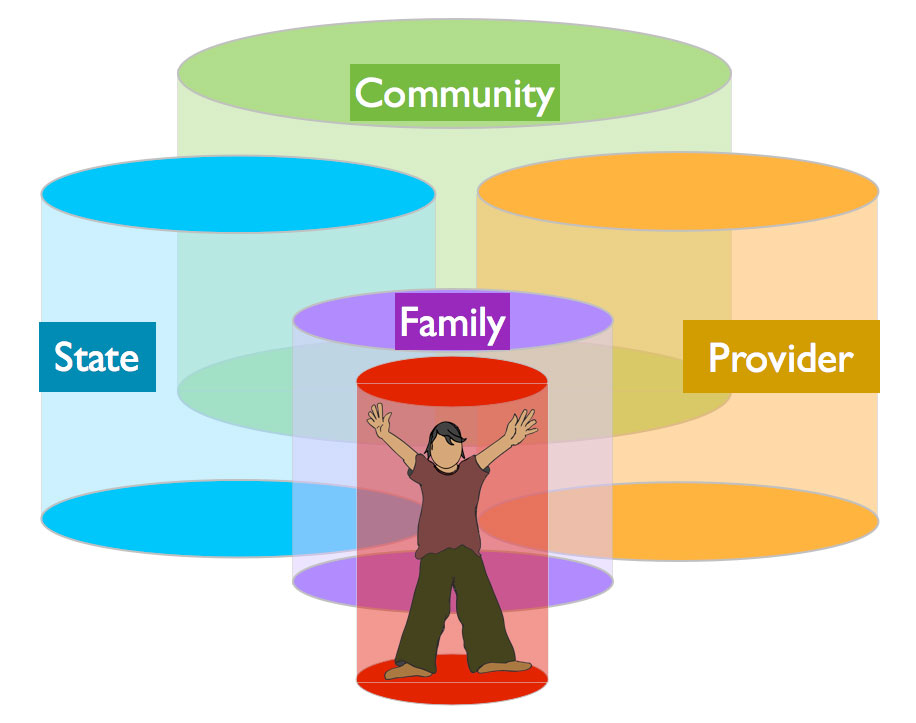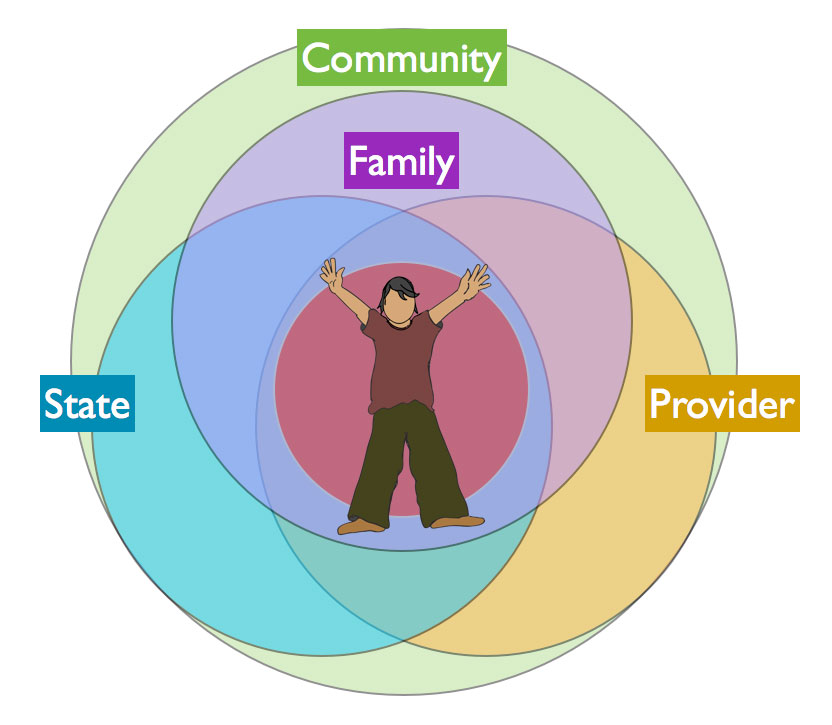We need each other
There is always the possibility that people can make things happen, simply by just doing it. That’s how leaders work. They don’t wait.
“There are people everywhere
who see something that needs to be done
and start doing it,
without the government’s permission
or advice or waiting for grants
...they just do it.”
Wendell Berry
So there is always the possibility of recognizing what is right, and just starting to do something about it, and we would encourage people to do this...everyone...everywhere...whenever we see something that needs to be done...don’t wait. But we know how hard that can be, how much courage it takes, and how risky it can feel, even dangerous sometimes.
Making change is always risky. There are lots of “I don’t know(s)” involved. Our own experience is that there is rarely a good reason to be alone when facing the “I don’t know(s)” of making change about something that is important. There is almost always someone else around who cares about the same thing that we care about. And those of us who care about the same things need each other. We believe it is best if we find good company on the journey to do something about what is important.
Recently we had the opportunity to spend a couple of days with 240 people in Missouri. They were a somewhat mixed group. There were “advocates”, some of whom were people with disabilities, some were parents and/or brothers and sisters of someone with a disability; there were people who worked for a service provider agency as direct support professionals, managers, and executive leaders; there were service coordinators; and the hosts of this gathering were people who worked for the state Division on Developmental Disabilities. We were all gathered to think about what we could do to make it possible for people with disabilities to direct their own lives and the ways they are supported.
Patti shared stories of real people that Neighbours Inc. has worked for over the last 17 years, people who live in their own “home”, hire and manage their personal assistants, consider how best to responsibly use the money resources that are available to them, and have sustained and developed relationships with family and people who have become friends. Patti shared how messy that can be, how it is always incomplete, there is always more to do, and we make mistakes all along the way. But in the end people feel like it is “their messiness”, and they figure things out along the way with people who they choose to help them think and act.
Patti has shared these experiences all over the world. When people in the group hear about how this is possible, they are either renewed in their passion to figure it out, or they have some internal shift, moving from “it is not possible” toward “I don’t know how we can do that here”.
There is always the possibility that people can make things happen, simply by just doing it. That’s how leaders work. They don’t wait.
“There are people everywhere
who see something that needs to be done
and start doing it,
without the government’s permission
or advice or waiting for grants
...they just do it.”
Wendell Berry
So there is always the possibility of recognizing what is right, and just starting to do something about it, and we would encourage people to do this...everyone...everywhere...whenever we see something that needs to be done...don’t wait. But we know how hard that can be, how much courage it takes, and how risky it can feel, even dangerous sometimes.
Making change is always risky. There are lots of “I don’t know(s)” involved. Our own experience is that there is rarely a good reason to be alone when facing the “I don’t know(s)” of making change about something that is important. There is almost always someone else around who cares about the same thing that we care about. And those of us who care about the same things need each other. We believe it is best if we find good company on the journey to do something about what is important.
Recently we had the opportunity to spend a couple of days with 240 people in Missouri. They were a somewhat mixed group. There were “advocates”, some of whom were people with disabilities, some were parents and/or brothers and sisters of someone with a disability; there were people who worked for a service provider agency as direct support professionals, managers, and executive leaders; there were service coordinators; and the hosts of this gathering were people who worked for the state Division on Developmental Disabilities. We were all gathered to think about what we could do to make it possible for people with disabilities to direct their own lives and the ways they are supported.
Patti shared stories of real people that Neighbours Inc. has worked for over the last 17 years, people who live in their own “home”, hire and manage their personal assistants, consider how best to responsibly use the money resources that are available to them, and have sustained and developed relationships with family and people who have become friends. Patti shared how messy that can be, how it is always incomplete, there is always more to do, and we make mistakes all along the way. But in the end people feel like it is “their messiness”, and they figure things out along the way with people who they choose to help them think and act.
Patti has shared these experiences all over the world. When people in the group hear about how this is possible, they are either renewed in their passion to figure it out, or they have some internal shift, moving from “it is not possible” toward “I don’t know how we can do that here”.
On the second day of our gathering, we asked people to have conversations in “mixed company”, in other words, not just talking with the people they came with, or who they identified with (families with families, coworkers together, etc). We asked them to consider, “what would need to be in place, for people to self-direct, directing their own lives and support in Missouri?”
Among the most talked about themes, was the notion that we need to “trust” each other” if we are going to make changes so that people can have a life that is theirs, not their parents, or the agency’s, or the state’s. Of course, the good people of Missouri are not the first to have told us this. We hear it everywhere we go. And we hear the stories about why we don’t trust each other, the long history of “us” and “them”. We hear about the “silos” that we live and work in that keep us separated...silos of individuals and self-advocates, families, providers, and state bureaucracy. And we hear about the divisions that create silos within silos.Our experience is that within each of these silos, there are people who see that people directing their own lives is important, and know that something needs to be done. But the silos create the illusion that we are separate. The silos create practical divisions, where we don’t see each other, we don’t know each other, so we don’t even know that we care about the same things. We don’t know that we could have good company with people from other silos who have perspectives and resources that could make the whole journey more exciting, more possible, less lonely. We could have company that gives us the courage to “see what needs to be done, and just do something, without waiting for permission”.
Our separateness is designed.
On some level we know that we need each other, that our separateness does not make us feel good about each other, or ourselves. We know that we are wasting precious energy and time, working in our silos.
So why do we keep doing it?
Among the most talked about themes, was the notion that we need to “trust” each other” if we are going to make changes so that people can have a life that is theirs, not their parents, or the agency’s, or the state’s. Of course, the good people of Missouri are not the first to have told us this. We hear it everywhere we go. And we hear the stories about why we don’t trust each other, the long history of “us” and “them”. We hear about the “silos” that we live and work in that keep us separated...silos of individuals and self-advocates, families, providers, and state bureaucracy. And we hear about the divisions that create silos within silos.Our experience is that within each of these silos, there are people who see that people directing their own lives is important, and know that something needs to be done. But the silos create the illusion that we are separate. The silos create practical divisions, where we don’t see each other, we don’t know each other, so we don’t even know that we care about the same things. We don’t know that we could have good company with people from other silos who have perspectives and resources that could make the whole journey more exciting, more possible, less lonely. We could have company that gives us the courage to “see what needs to be done, and just do something, without waiting for permission”.
Our separateness is designed.
On some level we know that we need each other, that our separateness does not make us feel good about each other, or ourselves. We know that we are wasting precious energy and time, working in our silos.
So why do we keep doing it?
- What stops us from gathering across silos to “figure out” what we can do about what we know is important?
- What is stopping us from designing a new way of being together, learning from each other, and trying things together?
We need each other.



 RSS Feed
RSS Feed